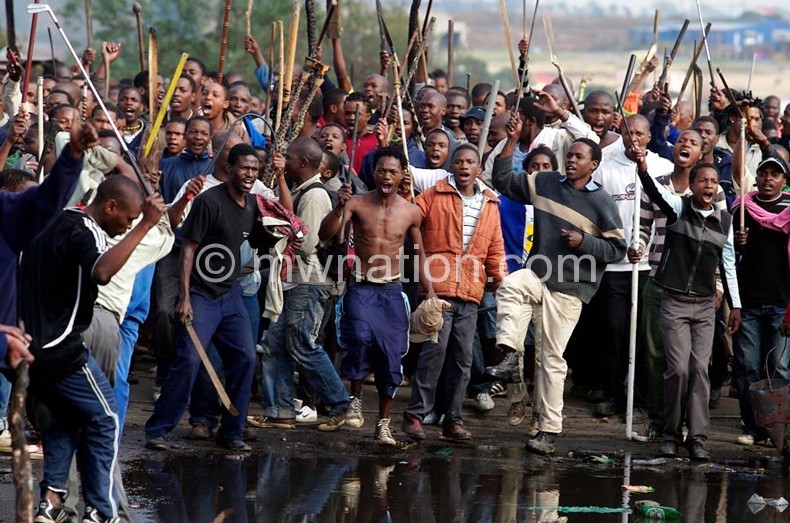Do Malawians need lectures in active citizenship?
Resting against a rough and rugged wooden chair close to his now useless kraal, Daniel Manda, 80, visualises the bravery of the Roman Catholic bishops who turned tables of the local politics in 1992.
It is barely a few minutes after 7 am and Manda turns his eyes to the empty kraal and maize barn. He tries to figure out where things went wrong that poverty levels should be rising instead of declining.

Manda is one of the oldest in the impoverished Matola Village in Traditional Authority (T/A) Kaluluma in Kasungu District.
“Should we curse the day we voted for the restoration of multiparty democracy in the April 14 1993 referendum? No, I don’t think so! I still believe bishops meant well [for us] when they called for change,” he narrates to his 23-year-old grandson, Matthew.
Matthew has just married and the family is struggling to pay dowry for his wife.
This could not have been the case had it not been for selfishness of politicians that saw Manda’s wealth declining instead of improving.
In his heydays, the octogenarian boasted of countless herds of cattle, goats, sheep and chickens. But he sold all to buy food to sustain the ever-growing family.
But today, he has nothing. He depends on the goodwill of his one daughter who is living in the city to supply him with necessities.
“Of course, it was unjust for the few in the ruling elite in the old Malawi Congress Party to be sharing the country’s spoils whilst the nation is starving. But do you think there has been any change?” he now engages the grandson into the discussion.
“Don’t you think we were fooled to believe that the modern crop of politicians would help us improve our living standards for the better?” he asks.
Manda says what pains him most is that those in positions of authority are amassing wealth with reckless abandon as lives of Malawians continue deteriorating.
“Honestly, this is very unfair,” he takes a long cough before recommending: “Something must be done to arrest this unequal distribution of wealth. And that must be done sooner than later!”
Genuine as his concerns and grievances may sound, Vice-President Saulos Chilima thinks Manda could be his own enemy of desired living standards.
Chilima believes Malawians are so passive that they cannot raise a finger even when leaders they themselves put into positions of leaders are messing up things.
He says it is such an open cheque that has turned elected leaders into assuming the role of shareholders instead of being accountable to the voter.
“When the ordinary people press for accountability, leaders in various political parties and in all positions in our communities will stop behaving like shareholders.
“The truth is that it is the ordinary people who are shareholders because they gave us these various positions. We need to be accountable to the ordinary people by delivering substantive results,” he states.
He adds: “In 2017, for instance, we need to make great strides and the ordinary people can ensure this by condemning and rejecting any wrong-doing and by commending the good things their leaders do.”
A Catholic priest, Father Frank Phiri, observes that most of the nation’s socio-economic challenges which have trapped ordinary Malawians in poverty have come about because people choose and clap hands for incompetent and crooked leaders who are hardly held accountable as they drive the nation into the mire.
“We cannot continue doing the same things and expect different results (of effective national progress). Let us resolve to make 2017 a year when the spirit of Mary will make us love our fellow human beings, and our country, much more,” says Phiri.
Chancellor College lecturer of political science, Professor Boniface Dulani, says he is not surprised that the bold and welcome statements are coming from the Veep who is a devout Catholic for it is the Catholic Church that helped guide the nation into embracing democracy from the 1990s when it spoke out against autocracy.
“…as a country, we stand to benefit if the populace were to be more critical of the leadership. I think, oftentimes, we have been leaving the fight to the media, maybe a few political commentators, the academia and civil society organisations, while the majority suffers in silence or they applaud mediocrity,” observes Dulani.
He laments that Malawi’s political culture is rather indifferent in ensuring that the masses question their leaders beyond the ballot box results; hence, the leaders not being held accountable for their misdeeds.
He criticises some party zealots who have been unfair in harassing and threatening critics who want the government to improve its performance.
Manda concurs. But knowing the character of Malawians, the octogenarian does not believe Malawians are well equipped to face their complacent leaders.
“Probably, the Vice-President should open Chilima College of Active Citizenship. Otherwise, we will remain passive and asleep while those in positions of leadership plunder our resources,” he sums up.





